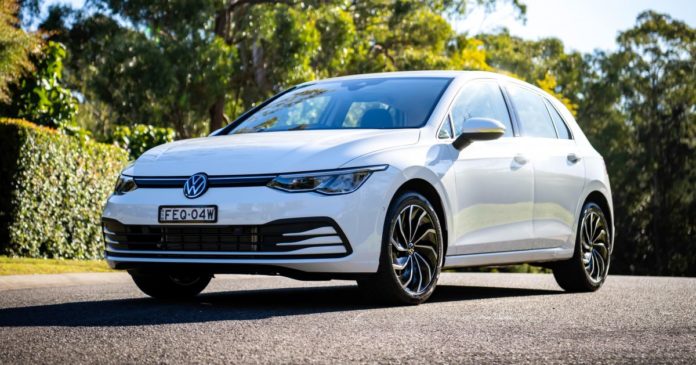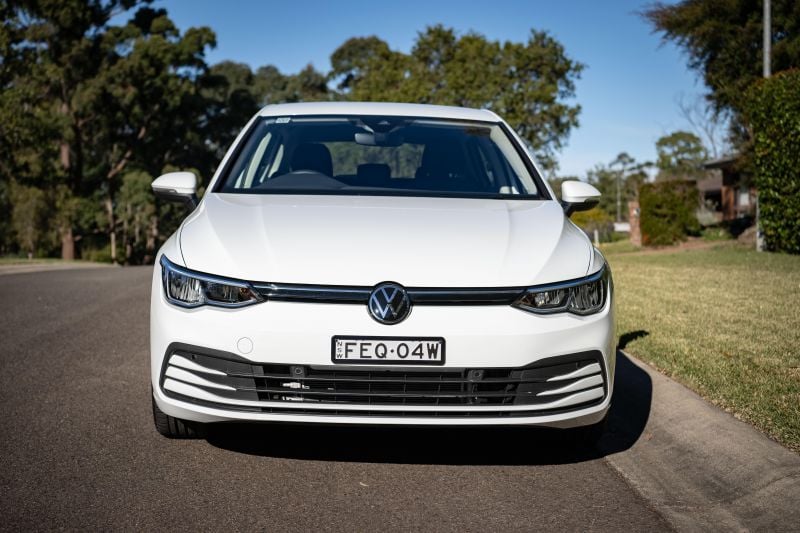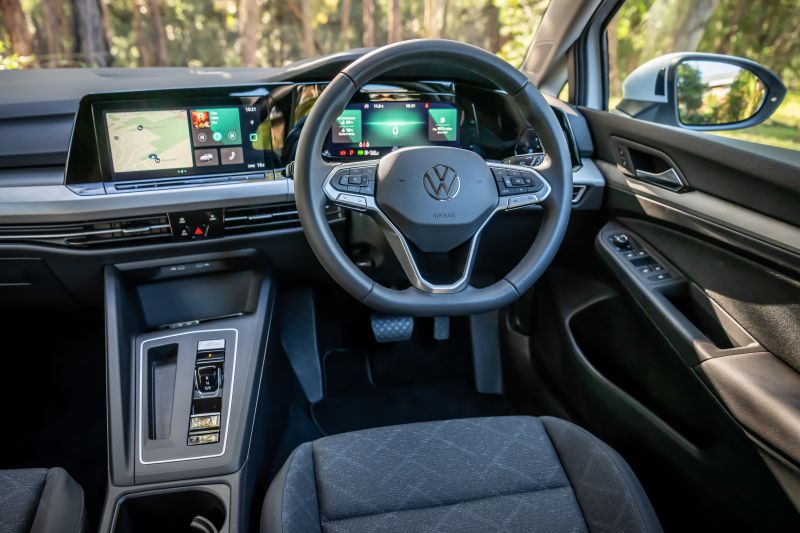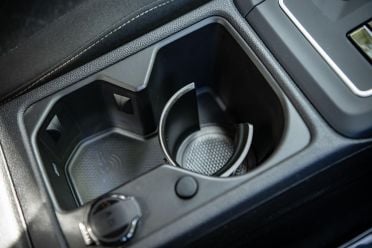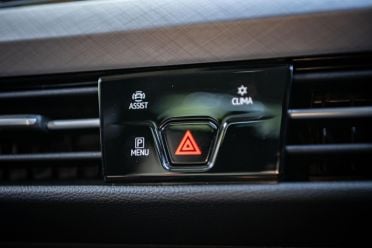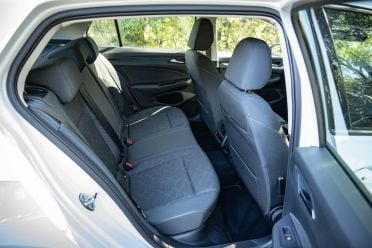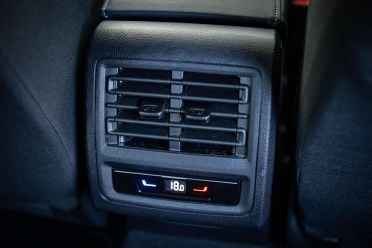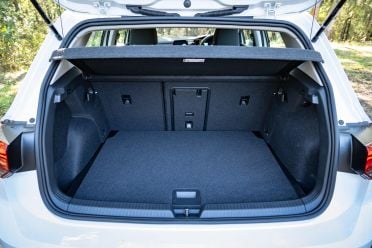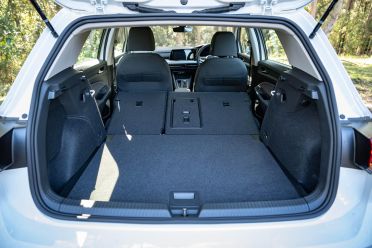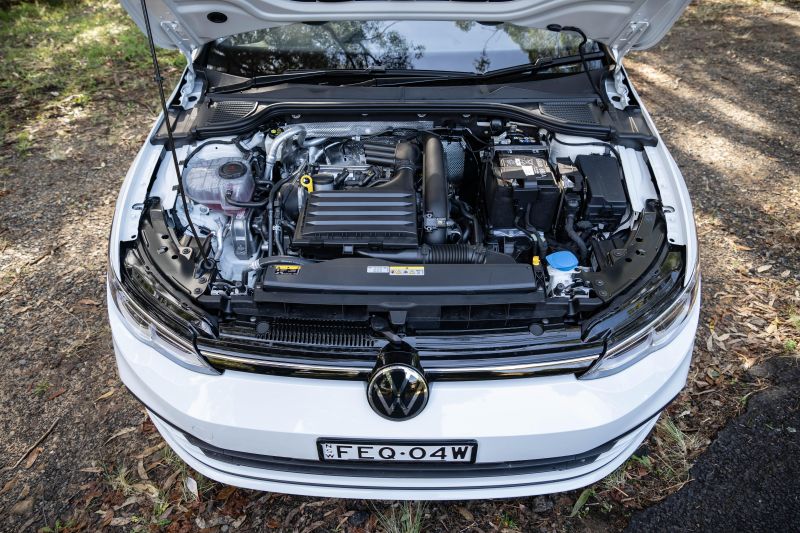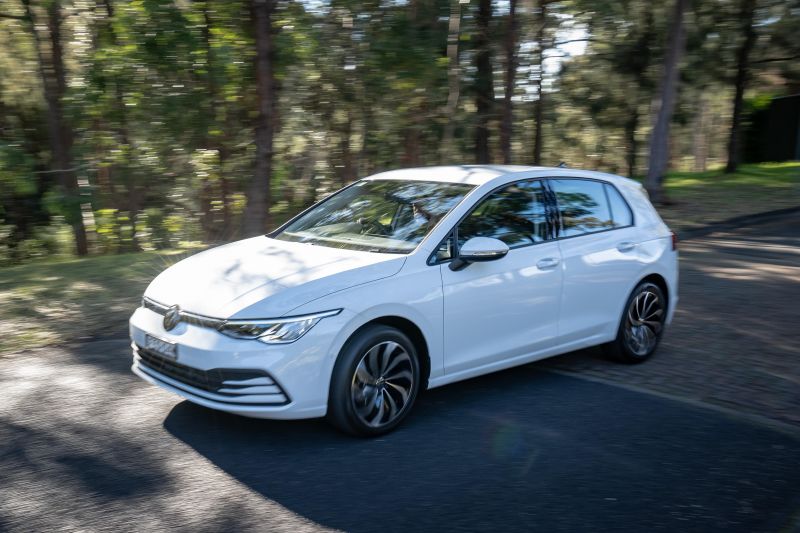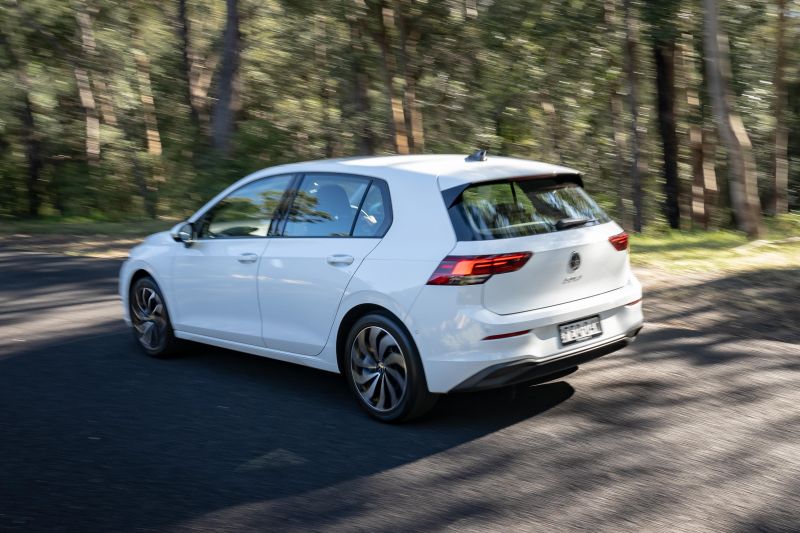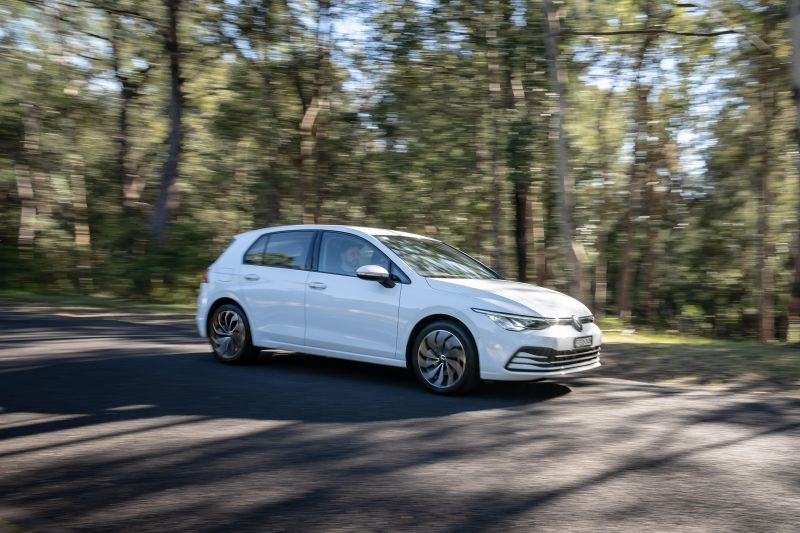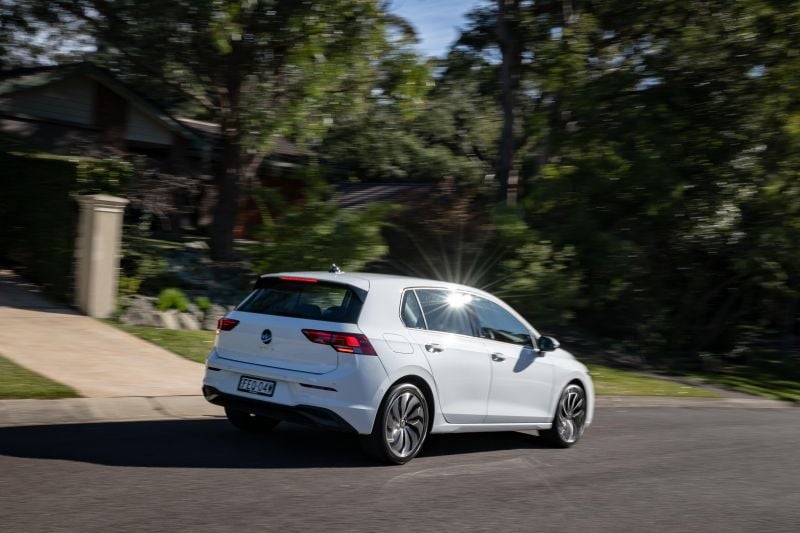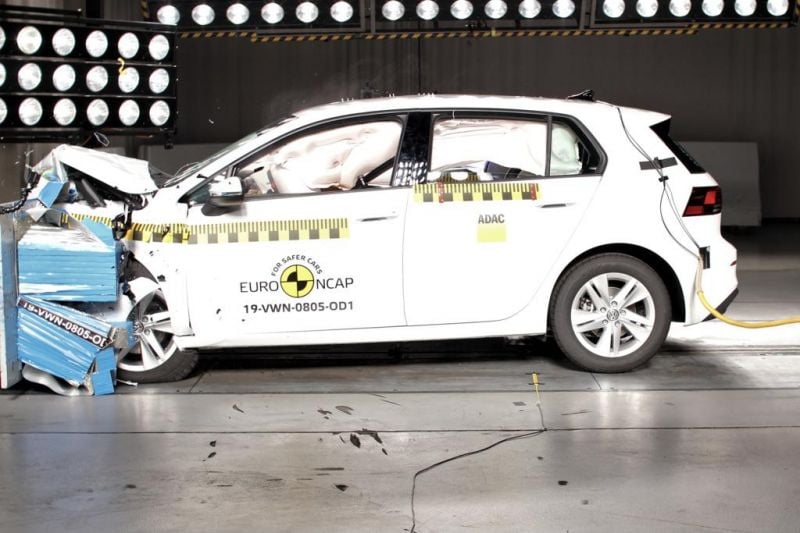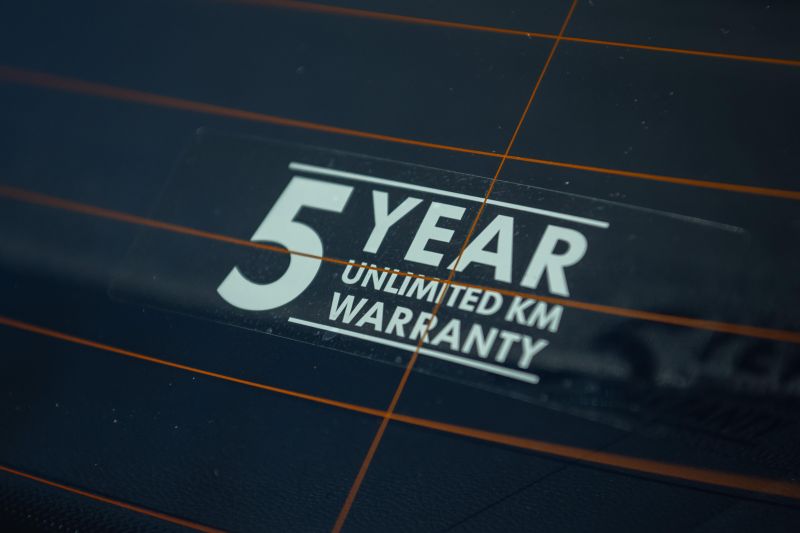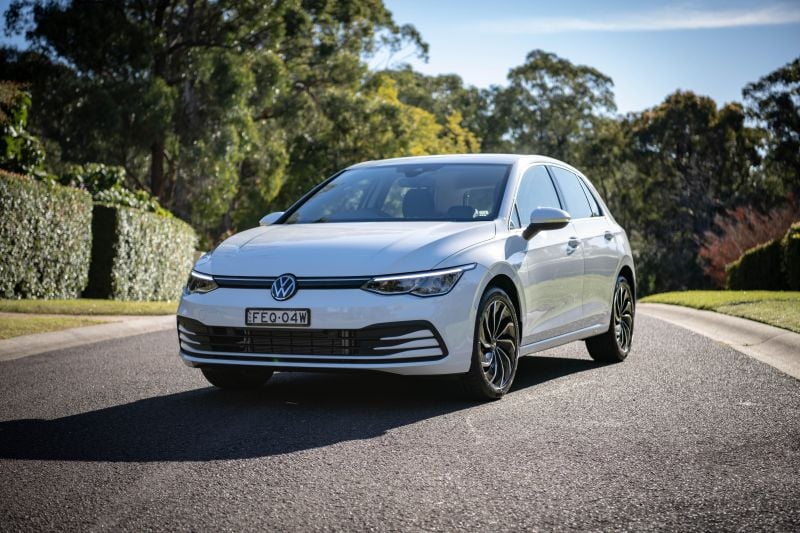The venerable Volkswagen Golf is still one of the best small cars that money can buy – it’s just a shame you need a fair bit more money to buy one these days than in years gone by.
The ‘base’ model tested here is just under $40,000 before on-road costs, and a bit more than that to get it into your driveway.
In fact, at the time of publication, this 2024 Golf 110TSI Life is a $41,990 drive-away proposition, and we’ve even got a white one with no options, so this is exactly the car you get at that promo price.
So, in a world where you could instead get a fully electric hatchback for less money, or maybe choose a petrol-electric hybrid, does the VW Golf still stack up?
You bet it does – read on to find out why.
How does the Volkswagen Golf compare?
View a detailed breakdown of the Volkswagen Golf against similarly sized vehicles.

Volkswagen
Golf
How much does the Volkswagen Golf cost?
On test here is the entry-level Golf Life – currently advertised for $41,990 drive-away.
| Model Variant | $RRP |
|---|---|
| 2024 Volkswagen Golf 110TSI Life | $39,190 or $41,990 D/A |
| 2024 Volkswagen Golf 110TSI R-Line | $42,290 |
| 2024 Volkswagen Golf GTI | $56,090 or $59,990 D/A |
| 2024 Volkswagen Golf R | $70,590 |
To see how the Volkswagen Golf lines up against the competition, check out our comparison tool.
What is the Volkswagen Golf like on the inside?
Classic VW Golf. Premium, elegant and mostly simple.
Well, apart from the media system, which I still struggle to get to grips with even after being exposed to this setup for a few years now.
As with most anyone who has driven a current Golf, the bits that take some learning include the haptic volume and temperature controls, and annoyingly there is no dial or button for fan speed (if you’re a fan fiddler like me, you’ll hate that).
You can jump into the climate screen by using the little temp display, and or hitting the ‘Clima’ control button below the screen – but it’s all stuff that buttons and dials did better in the last gen.
At least there’s a set of actual buttons on the steering wheel, instead of haptics. Those are welcome!
Beyond those controls being a little less than perfect, the screen has a heap of menus and info panels, including built-in sat nav, as well as multiple displays to adjust settings and driving features.
There’s also wireless Apple CarPlay and Android Auto, and even this base model has a wireless phone charger, too.
Plus there’s a fully digital instrument panel which is crisp and looks smart, and has manageable and learnable controls by way of the steering wheel buttons.
The cabin has good storage up front, including a pair of cupholders between the seats (adjustable to turn into an open stowage hole instead, if you wish) and there’s a little tiny storage pocket under the centre armrest.
Front doors have large pockets with bottle holsters moulded into them, and they are lined for rattle-free driving.
The seats are great. Super comfortable and supportive, and though they are manual and not heated, there is ample height adjustment and bolster adjust.
This is a weird comment, but I’ve made it to VW execs in the past — my Mum has really short legs, and finds the seat base too lengthy for her to get comfy. That may or may not factor into your decisions if you’re more than 4’11” (just under 150cm)!
In the back there’s ample room for two adults to fit, and three in a squeeze. That’s mainly due to the huge transmission tunnel intrusion that eats into foot space, because otherwise it’s wide enough to fit three regular-sized adults.
I can fit behind my own 182cm/6’0” driving position, but my knees brush the seat ahead and I have a limited amount of foot space.
I think it’s great to see VW offer three-zone climate control in this entry model, with directional vents for rear riders. And of course there are ISOFIX points in the window seats and three top-tethers.
There’s impressive stowage in the back with map pockets on both seat backs, and a pair of upper pockets for devices or tissue packs or lollies – neat!
There are also lined door bins for bottles, a flip-down armrest with cup holders, and a ski port even on the base model!
Some of the back door plastics are a harder variety than up front but at least the ambient light strips flow to the second row.
The boot is a good size for a little car, with 374 litres of cargo capacity on offer with the seats up, which expands to 1230 litres with the seats folded down.
They don’t go totally flat but with the boot floor in its highest position there is a flat enough space for an IKEA run, or you can lower that boot floor down to maximise room if you’re using the back seat.
There’s a space-saver spare wheel under the boot floor, and shopping bag hooks to stop things flying around in the boot.
| Dimensions | Volkswagen Golf 110TSI Life |
|---|---|
| Length | 4284mm |
| Width | 1789mm |
| Height | 1456mm |
| Wheelbase | 2636mm |
| Boot capacity | 374-1230 litres |
To see how the Volkswagen Golf lines up against the competition, check out our comparison tool.
What’s under the bonnet?
The entry-level Golf runs a 110TSI powertrain, and in this instance it’s a 1.4-litre four-cylinder turbo-petrol engine.
As you may have guessed, the power output is 110kW (5000rpm) and there’s 250Nm of torque (from 1500-4000rpm). This model has an eight-speed torque-converter automatic as opposed to a dual-clutch DSG auto that is employed in other Golf variants. It’s front-wheel drive.
Towing capacity is 660kg unbraked and 1500kg braked, which is good for a small car like this (better than some small SUVs, in fact!).
It requires 95 RON premium unleaded petrol, and has an official combined cycle fuel use figure of just 5.8 litres per 100km.
On test, I’ve seen an impressive return of 6.3L/100km, including a few longer highway stints that saw the display drop to 4.6L/100km, so it may be a great choice for those who do distance commuting.
How does the Volkswagen Golf drive?
It’s such a comfortable and stress-free drive experience.
Because this version of the Golf doesn’t have a DSG dual clutch auto – instead it has an eight-speed torque converter – it’s less fussy to take away from a standstill, and there’s less potential for concern about picking a gap in traffic as a result.
The downside of this auto is when you ask a bit more of it in open road situations, it can feel a bit confused. It’s not terrible, just not as snappy as a DSG when you go to overtake or suddenly need more from the powertrain. There’s also no Auto Hold button so you have to keep your foot on the brake at a stop.
The engine is a good one, too, with easily enough zest and grunt to get things moving with a full load of family, and it’s zippy in urban driving if you’re on your lonesome too.
While it might not be a GTI, it has a great road manner to it as well.
The suspension is well calibrated and offers a comfortable and controlled ride, with predictable handling and accurate steering making this an easy daily car, but also handles itself well if you need or want to ask a little more of it.
Even this base model has independent rear suspension, so it can handle itself, and while the Nexen NFera Sport tyres aren’t the last word in performance rubber, it really is a predictable and likeable thing to drive.
The brakes however might take some acclimation. They are a bit grabby and also quite loud – like, you can hear the brakes over anything else at lower speeds.
You only get a reversing camera, but it’s a good one, and there’s a wide-view display as well. There are also front and rear parking sensors as standard, as well as an auto parking system if you want to use it.
There’s an excellent Manoeuvre Braking system which can detect obstacles or people and hit the brakes if the system thinks you won’t. It did that for me with a passing pedestrian, and boy was that a relief.
Another plus is that the safety aids in this car aren’t overbearing, with none of that beeping-bonging nonsense that other cars have.
The adaptive cruise control is good, but if you’re in a left or middle lane and trying to maintain pace, it won’t go faster than the car in the right lane, even if it’s a slowpoke.
I understand there’s a German “you don’t hog the fast lane” level of good intent from this tech, but the reality is that lane discipline is not an Aussie strong suit, and it can be frustrating because you can’t turn that ‘safety’ feature off.
Another criticism common to this generation of Golf models is there’s quite a bit of road noise on the highway, especially on coarse-chip surfaces.
What do you get?
On test here is the entry-level Golf 110TSI Life variant.
Golf Life highlights:
- 17-inch alloy wheels
- Automatic LED headlights
- LED tail lights
- Rain-sensing wipers
- Power-folding side mirrors
- 10-inch touchscreen infotainment system
- Wireless Apple CarPlay and Android Auto
- 7-speaker sound system
- Wireless phone charger
- Satellite navigation
- Tri-zone climate control
- 10-colour interior ambient lighting
- Keyless entry and start
- Auto-dimming rear-view mirror
- Cloth upholstery
- Comfort front seats with lumbar adjustment
- Luggage partition
- Ski port
- Space-saver spare wheel
- Puddle lights
- Illuminated exterior door handles
Is the Volkswagen Golf safe?
The Golf range has a five-star ANCAP safety rating from 2019 tests.
It scored 95 per cent for adult occupant protection, 89 per cent for child occupant protection, 76 per cent for vulnerable road user protection, and 80 per cent for safety assist.
Standard safety equipment includes:
- 9 airbags incl. front-centre airbag
- Autonomous emergency braking (AEB)
- Pedestrian, Cyclist detection
- Multi-collision brake
- Applies brakes if you’re in a crash, preventing further chaos
- Lane keep assist
- Travel Assist
- Front cross-traffic alert
- Rear cross-traffic alert
- Blind-spot monitoring
- Adaptive cruise control with stop/go
- Driver fatigue monitoring
- Park Assist
- Reversing camera
- Front, rear parking sensors
- Emergency Assist
- Safe exit warning
How much does the Volkswagen Golf cost to run?
Like all Volkswagen models sold in Australia, the Golf comes with a five-year, unlimited-kilometre warranty.
Logbook servicing is required every 12 months or 15,000km.
2024 Volkswagen Golf 110TSI service pricing:
| Service Interval | Price |
|---|---|
| 12 months/15,000km | $520 |
| 24 months/30,000km | $763 |
| 36 months/45,000km | $506 |
| 48 months/60,000km | $1176 |
| 60 months/75,000km | $506 |
That might seem pricey, but Volkswagen offers a prepaid service package for three or five years, which reduces the cost by a bit. The three-year plan is $1610 (saving of $177), and the five-year plan is $2950 (saving of $518).
There’s one year roadside assistance included for free, which will renew when you service with the brand. Also, if you finance through VW Australia, you have the option of setting a guaranteed future value for your car – could be a nice fallback, if you’re planning to take out a loan anyway.
CarExpert’s Take on the Volkswagen Golf
It mightn’t be electric, or even hybrid, but the VW Golf is still a modern and compelling choice for a hatchback buyer who wants something that feels a bit special inside and drives really, really nicely.
Personally I’d spend a little bit more to get into the R-Line, but if you’re cool with this more comfortable, less audacious choice, then you’ll be happy with it, I reckon.
Click the images for the full gallery
MORE: Buy a Volkswagen Golf
MORE: Everything Volkswagen Golf

